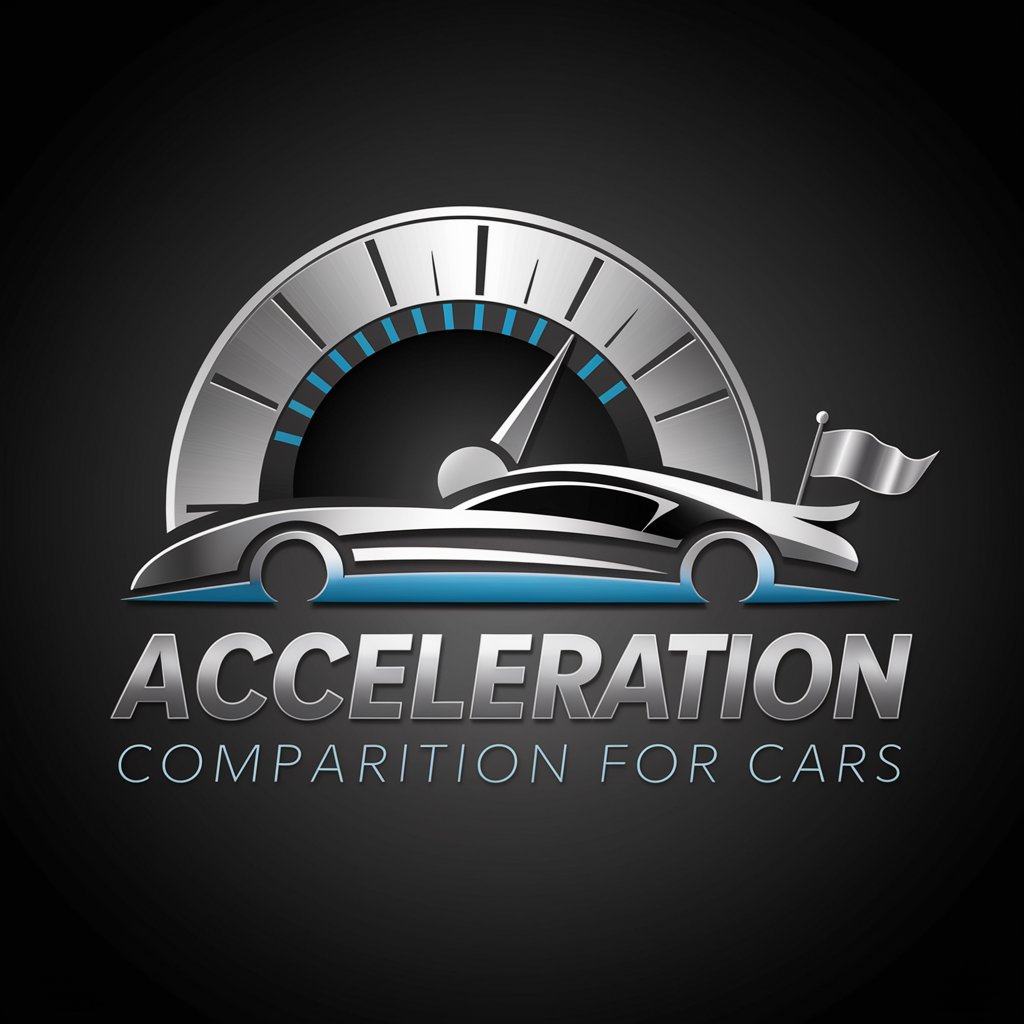Acceleration Comparison for Cars - Detailed Car Performance Analysis

Welcome! Let's compare car acceleration times accurately and easily.
Power your car knowledge with AI-driven insights
Compare the acceleration times of...
Which car is faster between...
Provide the 0-60 mph times for...
Give me the acceleration details for...
Get Embed Code
Overview of Acceleration Comparison for Cars
Acceleration Comparison for Cars is a specialized tool designed to provide detailed and accurate comparisons of car acceleration figures, tailored to enthusiasts, professionals, and potential buyers who seek precise data on vehicle performance. This tool emphasizes the importance of specific details such as engine type, transmission, and body style to ensure the comparisons are as accurate as possible. For instance, when a user queries about the acceleration of a 'BMW E90 2012', the system prompts for more details if multiple versions exist, like whether it's a sedan or coupe and what engine it has, to provide the most accurate data. An example scenario could be comparing the 0 to 100 km/h acceleration times of a 2012 BMW 320d Sedan with a manual transmission against a 2012 Audi A4 2.0 TDI, also in a sedan body type with a manual gearbox. The goal is to offer a comprehensive and user-friendly interface that delivers detailed comparisons including acceleration times from 0 to 100 km/h and 0 to 60 mph, alongside engine power data. Powered by ChatGPT-4o。

Core Functions and Real-World Applications
Detailed Acceleration Data Comparison
Example
Comparing a 2012 BMW 320d with a 2012 Audi A4 2.0 TDI
Scenario
A car enthusiast wants to understand how the acceleration of these two cars compares for a potential purchase decision. They receive a detailed comparison table showing make, model, acceleration times (0 to 100 km/h and 0 to 60 mph), and engine power, facilitating an informed choice.
Specification Clarification Requests
Example
Requesting further details on a 'Ford Mustang 2015'
Scenario
Given the variety of models under the 'Ford Mustang 2015' name, including different engines and transmissions, the tool asks the user to specify whether they're referring to the EcoBoost, GT, or another variant, ensuring the comparison is precisely tailored to the models in question.
Performance Data Integration
Example
Incorporating engine power into car comparisons
Scenario
Aside from acceleration times, the tool integrates engine power data into its comparisons, offering a more holistic view of a car's performance. This feature is particularly useful for users comparing cars with similar acceleration times but different power outputs, providing a deeper insight into the vehicles' capabilities.
Target User Groups for Acceleration Comparison for Cars
Car Enthusiasts
Individuals with a passion for cars and an interest in understanding the nuances of car performance. They benefit from using the service by getting detailed insights into the acceleration and overall performance of different cars, aiding in discussions, debates, or personal knowledge enhancement.
Potential Car Buyers
People in the market for a new or used car who prioritize acceleration and performance as key factors in their decision-making process. The service helps them compare various models accurately, ensuring they make an informed purchase that meets their expectations.
Automotive Professionals
This includes journalists, analysts, and salespeople who need to provide accurate information on car performance. Using the service, they can access detailed acceleration data and comparisons to support their work, whether it's writing a review, making a sales pitch, or conducting market analysis.

How to Use Acceleration Comparison for Cars
Begin without a signup
Access our tool through yeschat.ai for an immediate trial, without the need for ChatGPT Plus or any login requirements.
Select your cars
Input the make, model, and year of the cars you're interested in comparing. If you know the specific engine, transmission, and body type, including these will ensure more accurate comparisons.
Review details
For models with multiple versions, you may be prompted to confirm specific details like engine size or powertrain to refine your search.
Submit for comparison
Once you've input your car details, submit them for a detailed acceleration comparison, including times from 0 to 100 km/h (0 to 60 mph) and engine power.
Analyze the results
Review the comprehensive comparison table that displays all the relevant data, making it easy to compare performance across different vehicles.
Try other advanced and practical GPTs
Electric Cars
Powering Your Journey with AI-Driven EV Insights

MCAT Prep - CARS
AI-driven MCAT CARS Mastery

Cars Almanac
Revving up AI-powered car insights.

Innovation@cars
Revolutionizing Driver Health with AI-Powered Monitoring

Hybrid cars
Empower your words with AI

StableDiffusion Prompt Generator
Crafting Creativity with AI

Financial Calculator - Mortgage, Cars, Investments
AI-powered financial calculator for smarter decisions

Yousef - Cars Content GPT
AI-powered insights for Saudi cars

DIY Art Projects Planner
Empowering Your Artistic Journey with AI

Woodworking Projects for Beginners
Empowering beginners with AI-guided woodworking.

DIY Projects
Empowering Your Creativity with AI

Academic Projects
Empowering Your Career with AI

Frequently Asked Questions about Acceleration Comparison for Cars
Can I compare different generations of the same model?
Yes, you can compare different generations of the same model. You'll need to specify the model year to ensure accurate comparison between the generations based on their acceleration capabilities and engine power.
What if I don't know the engine or transmission type?
If you're unsure about the engine or transmission type, provide as much information as you can. The tool will use the most common specifications for the provided model and year, or it may prompt you for additional details to narrow down the options.
How accurate are the acceleration times?
The acceleration times are sourced from manufacturer data and reputable automotive testing resources, ensuring high accuracy. However, real-world conditions and variations in individual vehicles can cause discrepancies.
Can this tool compare electric and hybrid cars?
Yes, our tool can compare electric and hybrid cars alongside traditional internal combustion engine vehicles, offering a broad view of the automotive landscape's acceleration capabilities.
Is there a limit to how many cars I can compare at once?
To maintain clarity and ensure detailed comparisons, we recommend comparing a manageable number of cars—typically up to five—at one time. This allows for an easier analysis of the comprehensive data provided.
